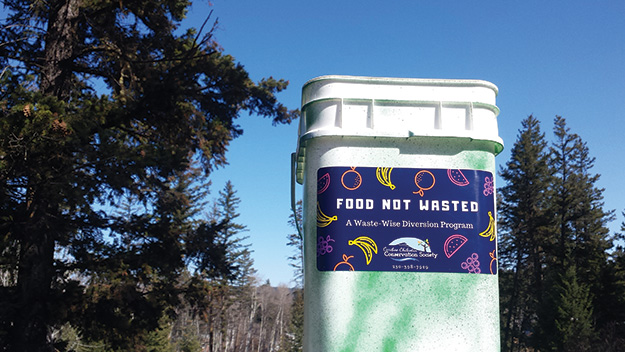By Oliver Berger —
Well, usually during my “No Time Left to Waste” articles you all read my venting about the serious garbage issues that plague our society. I want to say, thank you for listening. In this article, leading up to the holidays where we should be most aware of our consumption and reduction, I am going to share with you some good news from this year.

Loop Resources has come to town partnering with Save-On-Foods in Williams Lake. Their program aims to divert as much edible and non-edible food waste as possible from the garbage stream to the Salvation Army Food Bank. From there the edible food will be used to make meals and meal packages for their guests. The non-edible food will be sent off to hungry animals on nearby farms. This is a huge step because most of the waste stream from a grocery store is food. I have had the privilege to be on a few audits of grocery store waste and the amount of food thrown away is sad. Presently, the Salvation Army receives on average 300 lbs of food waste per day from Save-On and since collaboration they have a much more nutrient-diverse menu to offer their clients. Any farmer or rancher can sign up to this program through their website. Go to www.loopresource.ca and click ‘Get Involved’.
The Cariboo Chilcotin Conservation Society’s program for diverting food waste, called Food Not Wasted, has successfully diverted over 15 tons of food waste from the landfill this year. In building this program, I got to know many restaurant owners and discussed waste diversion ideas. Quite a few already have food waste buckets set up for farmers; others use the Potato House Sustainability Project or friends for composting. Comprising all the data, with all these powers combined, Williams Lake restaurants have diverted over 25 tons of food waste from the landfill in the last 365 days. If you are a restaurant owner in town and you do not save your food waste for a farmer or a compost pile, you are the minority. If you would like to change that, contact the Conservation Society at (250) 398-7929.
The Williams Lake Association for Community Living has a program called WLACL Works, which helps to support people with intellectual disabilities in our community by bringing them into the workforce. Their confidential paper shredding program has grown significantly in the past few years. Local businesses are now opting to use the WLACL Works program to help with their other recycling, too. The team will also take care of diverting refundables, cardboard, rigid plastic containers, coffee cups, electronics, and a most recent addition… compost. You can contact WLACL Works team at (778) 412-9364 to find out more.
We in British Columbia can be proud of our recycling program. Many articles online and in the news lately are showing the failing efforts of recycling programs across the country and worldwide. We are led to believe our items are sorted and reprocessed into new materials, only to find out later that it just gets burned or dumped unsustainably. Recycle BC, which luckily happens to be our local Cariboo recycling program, has secure markets for the materials they collect. This hard-working non-profit organization does nearly 150 audits every month to make sure contamination rates are minimal. They take multiple trips to processing facilities all around the world to verify product processing and continuously research new ways to recycle and repurpose our Blue Bin items. We can sleep at night knowing that the recyclables we clean and sort actually go somewhere to be processed into new items or new energy. I recommend reading Recycle BC’s full response to the recent backlash on recycling here: www.recyclebc.ca/response-marketplace/?fbclid=IwAR3UvjsBIy4z1QSWTQZVDDA9P_AG2YSlMWKpjamfJQow-EX_jys5vWXPCso
We can still brag about how full our recycling bins are compared to our garbage cans, alas we should remember recycling is one of our last resorts. If you really want the gold medal for being waste-wise work on the Reduce and Reuse first.

Oliver Berger has a 37-year degree in life, starting out in the Spokin Lake area, spending adolescence in Williams Lake, and then venturing throughout the world on a quest of always learning new things. His priorities include dedication to and education about waste management.
![]()

